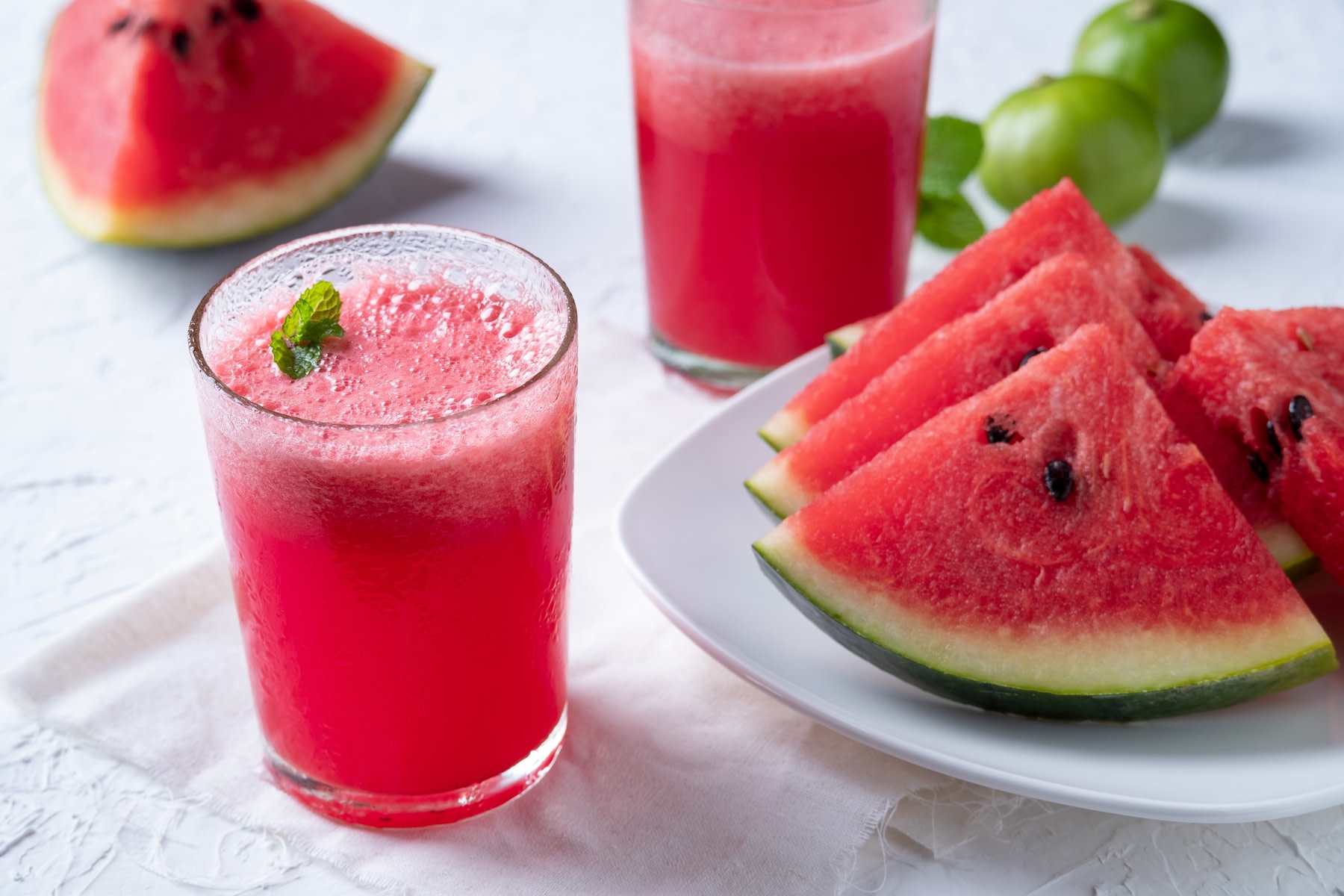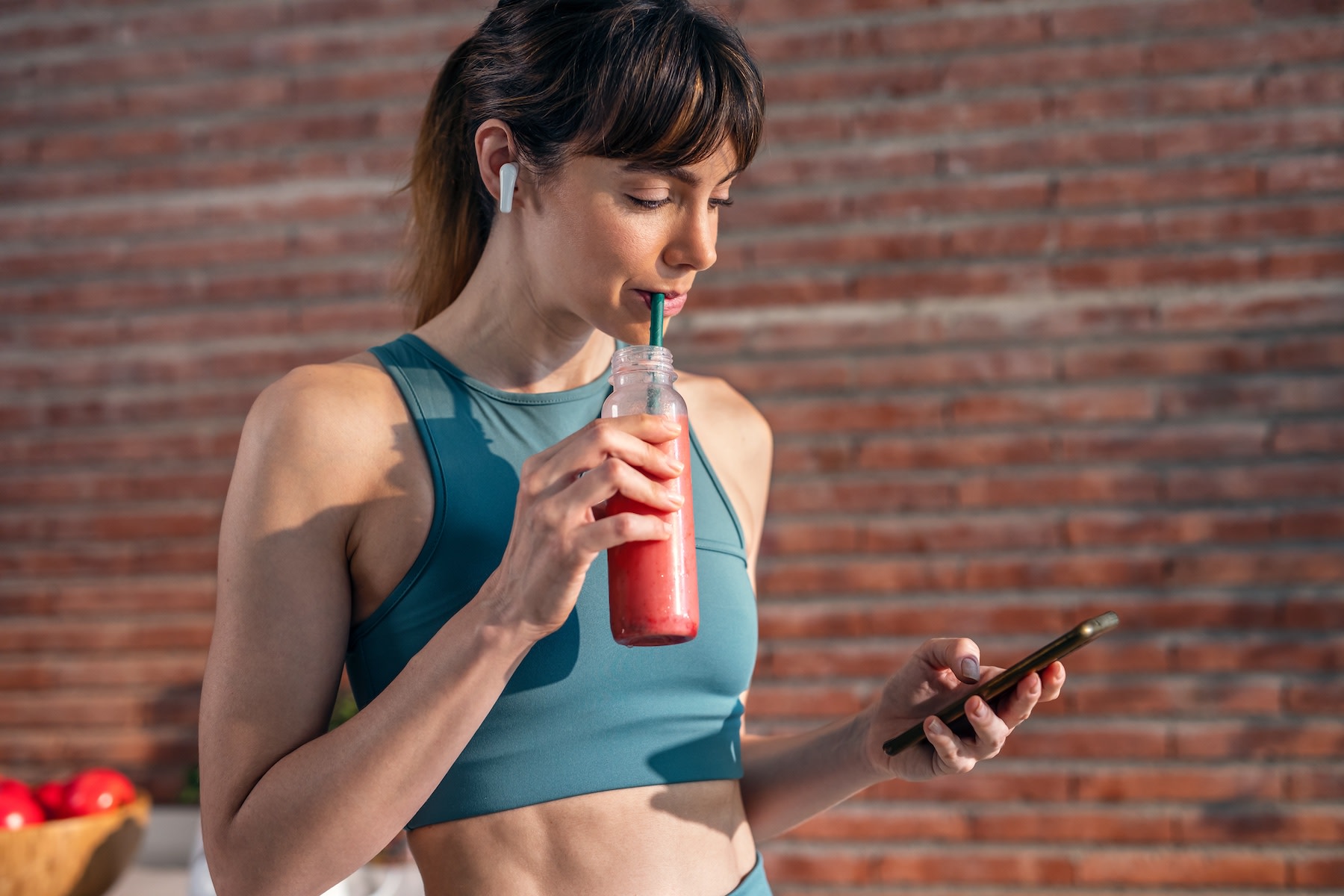
Kritchai Chaibangyang / iStock / Getty Images Plus via Getty Images
Should Watermelon Juice Be Your New Pre-Workout Drink of Choice?
Who needs a sports drink when you have this delicious fruit juice?
By Karla Walsh•
Watermelon Juice Benefits
Is Drinking Watermelon Juice Just as Beneficial as Eating Watermelon?
Tips for Making and Drinking Watermelon Juice
Is There a ‘Best’ Time to Drink Watermelon Juice?
Are There Any Drawbacks of Drinking Watermelon Juice?
The Takeaway
Since we were kids, we’ve been told to aim for eight glasses of water each day, and a growing body of science suggests that drinks like tart cherry juice and chocolate milk are seriously smart sips for athletes in particular. But there’s another beverage you should consider adding to your rotation: watermelon juice. And the watermelon juice benefits we dive into below are proof that this pretty-in-pink drink is not only hydrating but also great for your body in a bevy of ways.
Discover more ways to reach your goals with Peloton
Ahead, dietitians share why you might want to add watermelon juice to your drink menu and how the juice stacks up to the fruit, plus tips for how to make it at home.
Watermelon Juice Benefits
You might want to add a glass of this naturally sweet juice to your list of go-to beverages after studying up on these notable benefits of watermelon juice.
1. It’s Hydrating and Flavorful
Water is great for us, but let’s be real: It’s not exactly “delicious.” Just like the whole fruit, “which is 92 percent water, watermelon juice contributes to your overall daily fluid intake,” says Kelly Jones, RD, a Newtown, Pennsylvania-based board-certified sports dietitian. “This may be helpful for those with active lifestyles who get sick of water, or want to choose a more natural option as a sports drink.”
2. It’s a Generally Healthy Option
Since it’s made from blended-up melon, you can probably imagine what watermelon juice tastes like: watermelon! Unless you choose to add sweetener or purchase a bottle of pre-made watermelon juice that’s spiked with sugar, honey, or another source of sugars, “it’s a healthy, no-sugar-added, sweet tasting drink that’s low in calories,” says Roxana Ehsani, RD, a Miami-based board-certified sports dietitian.
3. It’s Rich In Vitamin C
Ehsani adds that watermelon juice is “an excellent source of immune-supporting vitamin C.” Each cup delivers 19.5 milligrams, which is a strong portion of your daily Rx: about 30 percent for women and about 26 percent for men.
And active individuals, listen up: Vitamin C also plays a role in protein metabolism, meaning it helps your body break down and absorb the muscle-building macro. Plus, watermelon juice’s antioxidant qualities might help combat free radicals and, as a result, potentially reduce risk for certain chronic diseases.
4. It’s a Good Source of a Recovery-Supporting Amino Acid
“Watermelon has garnered attention from athletes and fitness enthusiasts due to its content of the amino acid compound L-citrulline,” Jones says. Two cups of the fruit provide anywhere from 286 to 1,266 milligrams of L-citrulline, “which emerging research shows may aid in enhancing recovery rate and reducing muscle soreness after exercise,” Jones adds. “Supplementation of L-citrulline itself has been shown to reduce post-exercise rate of perceived exertion and muscle soreness, so consuming watermelon juice itself, with its natural L-citrulline content, may aid in post-workout recovery.”
5. It Contains a Strong Dose of Lycopene
Perhaps you’ve heard about another antioxidant, lycopene, found in tomatoes? Well “watermelon is higher in the antioxidant lycopene than any other fresh produce—even tomatoes,” Jones says.
One cup of watermelon juice has about 11 milligrams of lycopene, a type of vitamin A that plays many roles in the body, including supporting heart and skin health. (For context, in North America, about half of the population consumes 2 milligrams of lycopene or less per day.) There’s no official recommended dose of lycopene; however, 12 milligrams per day has been suggested to be enough to potentially lower blood pressure. Jones adds that “there may be an association between lycopene intake and reduced risk of breast, prostate, and lung cancer, though as with most research on cancer, more studies are needed.”
6. It’s an All-Natural ‘Electrolyte Drink’
If you normally sip an electrolyte drink after exercising, you may want to consider a glass of this fruit juice instead. One cup of watermelon juice delivers an impressive 269 milligrams of potassium, about 10 percent of your daily value. “Potassium is an electrolyte that supports fluid balance and muscle function, [and it’s] also supportive of healthy blood pressure levels,” Jones says.
Additionally, a cup of watermelon juice covers about 7 percent of your daily requirement for magnesium, a mineral that plays a role in protein synthesis, bone formation, as well as the regulation of blood pressure, blood sugar, and muscle function. And if you’re trying to limit sodium intake, watermelon juice can help, as it contains almost none. (Conversely, if you’re a salty sweater, you may still need a sodium boost from other foods and drinks after a long, vigorous workout, such as salted nuts or cottage cheese—but check in with your doctor or a dietitian to see what’s right for you.)
7. It May Support Heart Health
Several of these nutrients in tandem appear to be good for your ticker. “In addition to supplying potassium and magnesium, which are fairly well-known as minerals that support heart health, both the lycopene and L-citrulline in watermelon may have benefits [for your heart],” Jones says. “Lycopene has been studied for potential to support a healthy blood pressure, and L-citrulline supplementation and watermelon consumption have been shown to potentially support vascular function.”

nensuria / iStock / Getty Images Plus via Getty Images
Is Drinking Watermelon Juice Just as Beneficial as Eating Watermelon?
No matter how you prefer to consume watermelon, it’s good for you. “Both eating watermelon and drinking watermelon juice can be beneficial, especially for those who have a high activity level and history of heart disease,” Jones says.
But if you had to pick between the two preparation styles, most nutrition experts advise eating watermelon whole. This is because many watermelon juice recipes involve straining the pulp, which strips away the fruit’s gut-friendly fiber. So if you’re like most American adults and struggle to meet your daily fiber goals (22–28 grams for women and 28–34 grams for men), “shoot for consuming a whole fruit over the juice the majority of the time, if you can, as it’s providing you with the whole package, including the fiber,” Ehsani says. “Most of us could use more fiber in our day, and eating the whole watermelon will help get you closer to meeting your fiber goals.”
That said, if you skip the straining process when making watermelon juice, the fiber will remain intact. Either way, “watermelon is already a lower-fiber fruit,” Jones says, so while every bit of the nutrient helps, you won’t be missing a huge opportunity to boost your daily fiber quota, either.
Fiber aside, watermelon juice does have a couple advantages on its fruit counterpart. Since it’s easy and convenient to drink, “you may get more concentrated benefits from juice due to its slightly higher content of potassium, vitamin C, L-citrulline, lycopene, and more,” Jones says. And if you’re seeking a quick energy-booster before a workout, watermelon juice might actually be a slightly better choice since it’s nearly fiber-free and has more carbs than protein or fat, two solid traits of a good pre-exercise snack).
All things considered: Opt for the fruit when you can, Ehsani advises, and drink watermelon juice every so often to help rehydrate, fill in any nutrition gaps, satisfy your sweet tooth, or power up before your next run or ride.
Tips for Making and Drinking Watermelon Juice
Making watermelon juice at home is a breeze:
Remove the rind and cut the watermelon into chunks. Remove the seeds if present.
Place the watermelon cubes in a blender pitcher.
Blend until smooth and frothy, which should take about 30 seconds.
If desired, pour into a pitcher or jar through a fine-mesh strainer. Discard the solids. (Just remember that straining cuts out the fiber.)
Refrigerate for up to 4 days.
To balance the natural sweetness, consider adding 2 tablespoons of lemon or lime juice for every 4 cups of watermelon chunks.
Store-Bought vs. Homemade Watermelon Juice
Both homemade watermelon juice and pre-made watermelon juice from the store are nutrient-dense and hydrating, Jones says. But their exact nutritional comparison can depend on how it’s prepared, or, if buying pre-made, the brand you pick.
“If you toss the entire watermelon in a blender and don’t strain out the juice, you are left with a chunky, fiber-rich drink. But if you strain it out, you are tossing the fiber,” Ehsani reminds us. Meanwhile, “store-bought juice may have extra ingredients tossed in to preserve the juice and keep it shelf-stable,” she says, so be sure to peek at the ingredient list and added sugars section of the nutrition facts panel.
Regardless of whether you strain or not, cutting the fruit immediately before juicing it means that your DIY juice will contain more vitamin C than nearly all of its store-bought competitors. The vitamin degrades with both heat and oxygen, Jones explains, so the longer it’s been on the shelf before you buy it (or in the fridge after you make it), the less vitamin C it probably packs.
But what you sacrifice in vitamin C, you gain in the lifespan and convenience of store-bought watermelon juice, which could be helpful if you need something quick and longer lasting. Commercial juices are often pasteurized, which extends the shelf-life, Jones says.
Is There a ‘Best’ Time to Drink Watermelon Juice?
There are several times in the day, week, and year that are especially ideal for swigging this pink drink, Jones and Ehsani agree. These include:
Before or after a workout, due to its hydrating properties and potential for reducing muscle soreness
During particularly hot days to help fill in any nutritional gaps for those who tend to lose their appetites
As a replacement for other sugar-sweetened beverages, such as soda, to reduce intake of added sugars
As a spirit-free swap for a cocktail, beer, or wine between or instead of consuming alcoholic drinks
Are There Any Drawbacks of Drinking Watermelon Juice?
As with any fruit juice, it’s important to remember that because watermelon juice has a higher ratio of carbs to protein and fat and is low in fiber, drinking it will increase your blood sugar.
“Anyone with diabetes, or who has prediabetes and a strong family history of diabetes, should consider pairing watermelon juice with sources of protein, fat, and fiber,” Jones says. “Protein, fat, and fiber can slow digestion and absorption of sugar, leading to a more stable blood sugar response.”
Try sipping your watermelon juice alongside a protein-topped grain bowl or salad, or pair it with a high-protein snack like cheese and crudites, a hard-boiled egg and a handful of nuts, or a slice of avocado toast sprinkled with flax seeds.
The Takeaway
Eating watermelon is almost always a wise idea, but drinking watermelon juice can be an even easier and more convenient way to obtain a concentrated dose of nutrition. Watermelon juice benefits range from aiding in muscle recovery and boosting energy to possibly promoting heart health and helping increase hydration levels. Since it’s relatively high in carbs, low in fiber, and is rich in water, watermelon juice can be part of a healthy pre-workout snack. If you drink watermelon juice after exercise, it’s wise to pair it with foods that contain protein, fat, and fiber to keep your blood sugar levels fairly even-keeled.

Peloton App
Access thousands of classes with no equipment needed.
This content is for informational and educational purposes only and does not constitute individualized advice. It is not intended to replace professional medical evaluation, diagnosis, or treatment. Seek the advice of your physician for questions you may have regarding your health or a medical condition. If you are having a medical emergency, call your physician or 911 immediately.
This content is for informational and educational purposes only and does not constitute individualized advice. It is not intended to replace professional medical evaluation, diagnosis, or treatment. Seek the advice of your physician for questions you may have regarding your health or a medical condition. If you are having a medical emergency, call your physician or 911 immediately.
Get our latest health stories straight to your inbox
Enter your email to get articles, expert-backed tips, and updates from Peloton sent to your inbox.
By providing your email address, you agree to receive marketing communications from Peloton.
For more about how we use your information, see our Privacy Policy.








